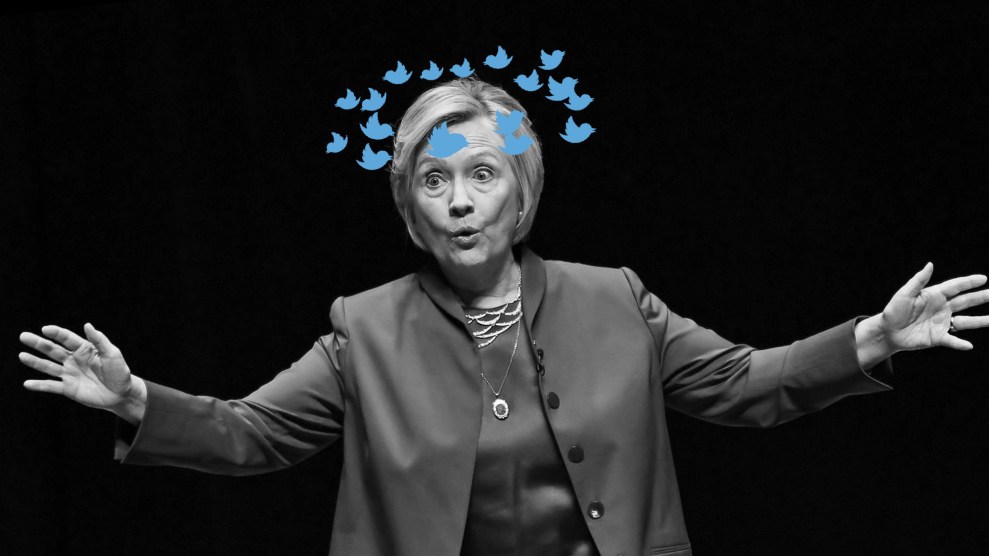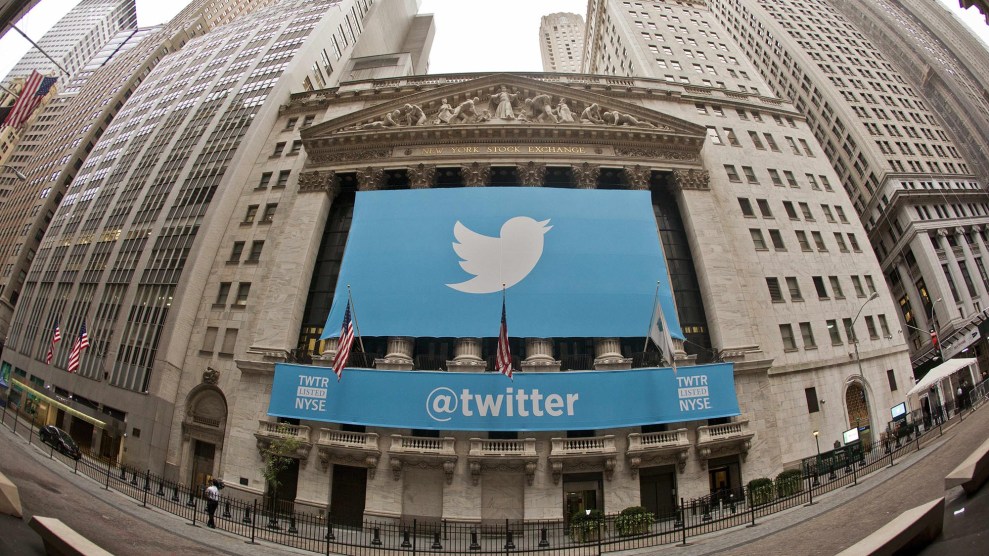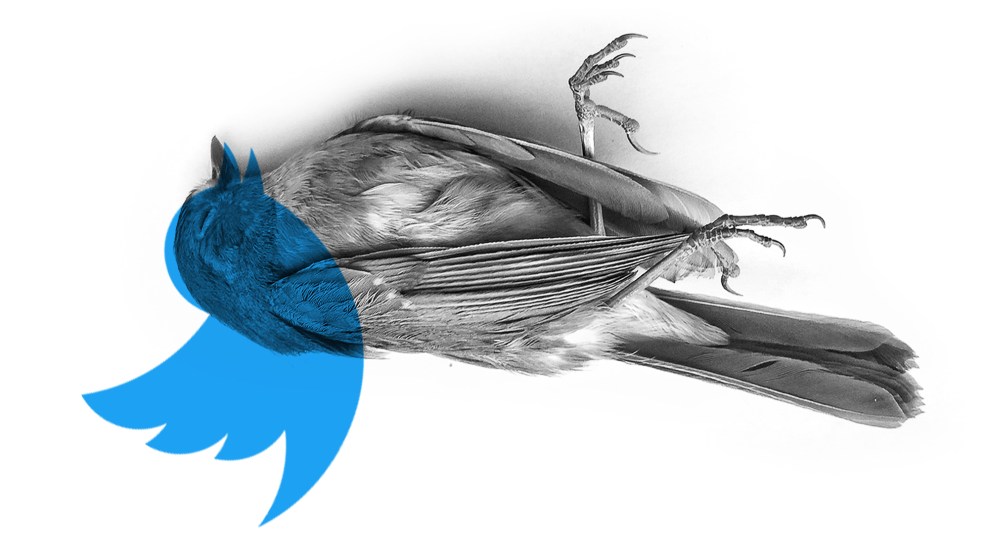
Mike Monteiro
This story originally appeared on Medium.
At some point in 2006, or possibly late 2005, Noah Glass walked into our office all excited about something. That in itself isn’t news because Noah was always excited about something. Dude had an energy. Noah worked across the hall from us on the sixth floor of a old broke-ass building in South Park. He came over all the time. He was friendly like that. Here’s why we’re talking about this particular visit: Noah was excited to tell us about a new thing he was working on. “You can use it to send group SMS.”
“That sounds stupid.”
“Look at the logo!”
“That’s even stupider.”
This was my first look at Twitter, or twttr, as it was annoyingly called then. I was right about the logo and wrong about the service. It wasn’t stupid, it was just hard to explain. So Noah showed it to me, and I still thought it was stupid. I’ll admit that it took me a while to get it. I didn’t care what people were having for lunch. I didn’t care where people were at. (Remember, this was also the golden age of check-in services, where people made sure all their friends knew where they were at all times lest they subject themselves to a moment of introspection.) Nevertheless, I signed up anyway, tweeted a few times, and was fairly close to deleting it a few times as well. Until one morning, I was in a cab headed to therapy, which meant I was in a mood and I absent-mindedly tweeted out “I’ve been shot!” then turned my phone off and went to talk to my therapist about becoming a well-adjusted human being.
Oh my God! I've been shot!
— Mike Monteiro (@monteiro) November 15, 2006
When I turned my phone back on I had about 20 new messages. Texts, voicemails, and a bunch of tweet replies. Including my now-wife, wondering what hospital I was at. That’s the day I discovered what Twitter was for. It was for having fun. And telling jokes. (BTW, my wife still doesn’t think this was a good joke.) That’s when I was hooked.
The first few years of Twitter were fun. The jokes piled up. I met other people who also liked to tell jokes. We even told a few non-jokes once in a while, like when someone was going through a hard time we’d stop telling jokes long enough to make sure they were ok. Then we’d go back to jokes. But seriously, it was mostly about making jokes. We even had a website that turned our stupid jokes into a deadly leaderboard game:
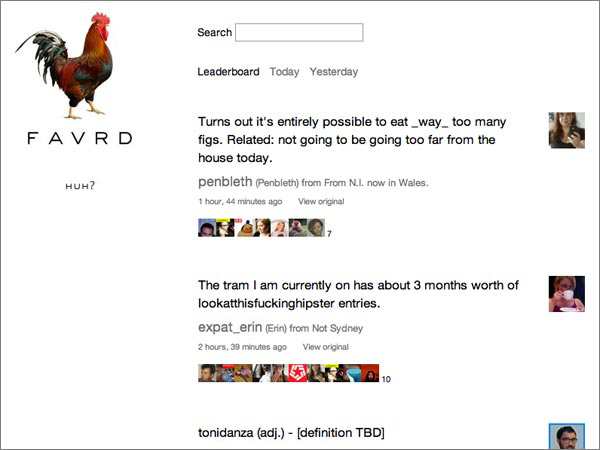
See that fool peaking out from that bottom right? He does car commercials now. Super famous.
At the same time as we were telling these dumb jokes we were also meeting a lot of new people. Twitter was a really great way to meet people. And believe it or not there was a time when you could say hello to someone and “fuck you you lib cuck” wasn’t the first reply that came to people’s mind! Some of my very closest friends today are people I met during the early days of Twitter. And here’s the really amazing thing: I still haven’t met some of those people. And some of them live halfway around the world.
I also know people who met on Twitter and have children now! Well-adjusted children. This happened. People met. Tweeted at each other. Got little crushes on each other. Figured out ways to meet in person and then made babies! People met on here and started businesses. Advertised jobs. Found jobs. Celebrated kids birthdays, and got support when a loved one died. Then inline images happened and we added photos of cats, kids, and sad Keanu to this wonderful mess.
Twitter also taught me how to be a better writer. (Count how many of these sentences are under 140 characters.) Seriously. I’m actually a pretty introverted person, and Twitter was a great way to shake that. (I wanted to shake it.) But as stupid as this might sound every little star (they will always be stars) gave me a little more confidence. And eventually what started as a place to tell jokes became a place to talk about design. And I got confident enough to start sharing those ideas too. I’ve written two books about design, and I can trace both of their origins to shit I said on Twitter. And when I was writing those books, I kept my book in one window, and Twitter in another window. If I thought a sentence was pretty good I pasted it into the Twitter text field to make sure it was 140 characters.
Twitter made me a better writer.
My first editor is probably reading that line and nodding and thinking “Fuck you. I made you a better writer, asshole.” And that’s true. But I met her on Twitter.
There was a time where Twitter was a place you went to fuck around, and accidentally made friends and got smarter. It’s been years since I’ve felt smarter after being exposed to Twitter, but trust me, those days were real. They happened.
I moved to San Francisco in 1999. I was part of that wave of people who moved here and destroyed the city. But I didn’t come here to get rich. (Every subsequent decision I’ve made since then bears this out.) I came here because the internet was new. It was exciting. It felt like punk rock for publishing on a global scale. We could make things and just tell the world. We didn’t need permission, we were gonna build a new way of communicating and everyone was gonna have a voice in this new world.
I wasn’t the only idiot who felt this way. San Francisco was full of hope and crazy back then. And sure, a lot of it was driven by money, but more accurately, it was driven by giving young hopeful kids a lot of money and waiting for them to make something that you could make money from. They were exciting times. We were young, stupid, and equipped with more processing power than any human being had ever possessed in history. (Also, a lot of fucking ecstasy.)
I remember walking around the city on those days. Lotta hope. Feeling a bit cocky to be honest. But we thought we were gonna change the world.
Here’s the bad news: we did.
Twitter was built at the tail end of that era. Their goal was giving everyone a voice. They were so obsessed with giving everyone a voice that they never stopped to wonder what would happen when everyone got one. And they never asked themselves what everyone meant. That’s Twitter’s original sin. Like Oppenheimer, Twitter was so obsessed with splitting the atom they never stopped to think what we’d do with it.
Twitter, which was conceived and built by a room of privileged white boys (some of them my friends!), never considered the possibility that they were building a bomb. To this day, Jack Dorsey doesn’t realize the size of the bomb he’s sitting on. Or if he does, he believes it’s metaphorical. It’s not. He is utterly unprepared for the burden he’s found himself responsible for.
The power of Oppenheimer-wide destruction is in the hands of entitled men-children, cuddled runts, who aim not to enhance human communication, but to build themselves a digital substitute for physical contact with members of the species who were unlike them. And it should scare you.
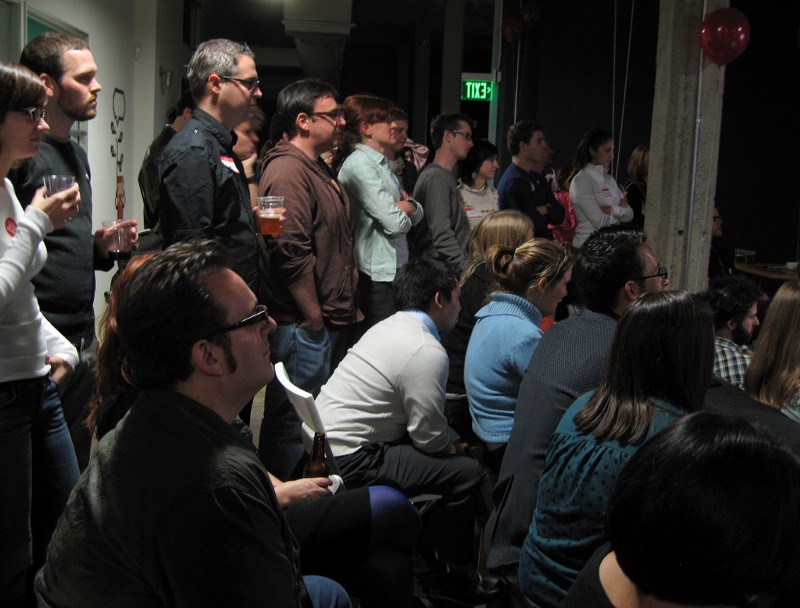
Election Night 2008 at Twitter HQ.
Scott Beale
On November 8, 2008 I watched Barack Obama win the presidency of the United States while I was sitting on Twitter’s office couch. I forget who invited me, but I was excited to be there because this felt like the first presidential election that the internet had an active part in. Whatever that meant. It felt like all of the tools the web community had spent the last ten years or more building had actually culminated in this moment. And I sat on that couch crying. I was getting to see this moment as a guest in the place that got all of these voices communicating. And all of those voices helped elect a president. In 2008 I thought Twitter helped elect a president.
I was off by eight years.
Alas, helping to elect presidents and taking credit for global movements isn’t enough to ensure company growth. From its inception, like most startups from the era, Twitter lacked a clearly defined business plan. Turns out changing the world isn’t a business plan. Now I am not a business expert. In fact, I know jack shit about business plans. So I won’t go into details about how or why or whatever else because I’d be making it up, and the internet is full of hot takes on this already. Some of them are written by smart people.
I will say this though: the goal of every venture-backed company is to increase usage by some metric end over end over end until the people who gave you that startup capital get their payday. This is the original sin of Silicon Valley. And Twitter had plateaued, and in the Valley plateauing is a thousand times worse than flaming out.
Twitter needed a spark. Twitter, not realizing they were sitting on a bomb, went looking for something to light the fuse. They were about to get it.
In March 2009 Donald Trump joined Twitter. No one noticed. Why would we? He was a washed-up NY real estate buffoon, exiled to the world of reality television and catchphrases. He was a buffoon willing to say anything for attention, and we reveled in his buffoonery.
He told Robert Pattinson that Kristen Stewart wasn’t good enough for him and we laughed.
He made fun of rival TV show ratings and we laughed.
He said Barack Obama wasn’t born in the United States and we laughed.
Except we didn’t all laugh. The idiot, the carnival barker, the fool was tapping into America’s own original sin: racism. And he was building an audience. A large audience. And like any self-obsessed paranoid sociopath he reveled in the attention. And he kept doing the thing that got him the attention. And the more attention it got him the more he did it. And the meaner he got the more attention we gave him.
Soon tweets about TV appearances and celebrities were replaced by tweets about birtherism, the Central Park murder, tearing down women, Muslims, and other assorted targets of hate. And his audience grew.
And at some point, and I don’t know exactly when or how or who—even scarier I don’t know if the people involved know when or how or who—Twitter made the decision to ride the hate wave. With their investors demanding growth, and their leadership blind to the bomb they were sitting on, Twitter decided that the audience Trump was bringing them was more important than upholding their core principles, their ethics, and their own terms of service.
And that, whenever that day might have been, is the day Twitter died.
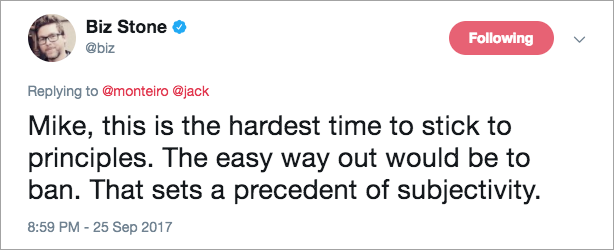
Twitter would have you believe that it’s a beacon of free speech. Biz Stone would have you believe that inaction is principle. I would ask you to consider the voices that have been silenced. The voices that have disappeared from Twitter because of the hatred and the abuse. Those voices aren’t free. Those voices have been caged. Twitter has become an engine for further marginalizing the marginalized. A pretty hate machine.
Biz Stone would also believe that Twitter is being objective in its principled stance. To which I’d ask how objective it is that it constantly moves the goal posts of permissibility for its cash cow of hate. Trump’s tweets are the methane that powers the pretty hate machine. But they’re also the fuel for the bomb Twitter doesn’t yet, even now, realize it is sitting on. There’s a hell of a difference between giving Robert Pattinson dating advice and threatening a nuclear power with war.
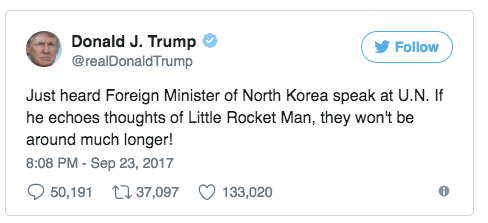
In an alternate universe, that tweet was immediately followed up by a press release from Twitter CEO Jack Dorsey:
“Twitter wholeheartedly condemns the recent tweets by Donald Trump towards North Korea. Twitter is a platform for global voices to come together. And though we are fierce advocates of free speech, we cannot stand idly by while our platform is used for harassment of another human or a sovereign nation. We expect all our users to abide by the terms of service they agreed to when they signed up for accounts. For this reason, we are putting a 24 hour ban on the @realDonaldTrump account. Once the offending tweets are deleted the account will be reactivated in 24 hours. Should the same offense recur we reserve the right to institute another temporary ban or ban the account completely. These rules apply to all users. Cheers, Jack Dorsey, Twitter CEO.”
That’s what principles look like. Didn’t happen.
Twitter today is a cesspool of hate. A plague of frogs. Ten years ago, a group of white dudes baked the DNA of the platform without thought to harassment or abuse. They built the platform with the best of intentions. I still believe this. But they were ignorant to their own blind spots. As we all are. This is the value of diverse teams by the way. When you’re building a tool with a global reach (and who isn’t these days) your team needs to look like the world it’s trying to reach. And ten years later, the abuse has proven too much to fix.
If @jack listened to WoC instead of just following us for show he could’ve dealt with this problem 5yrs ago. He just doesn’t care.
— No One (@judeinlondon2) October 14, 2017
I’ve known plenty of people who’ve worked at Twitter over the years. Most have left by now. Usually out of frustration. And their stories aren’t mine to tell, so I won’t. But I’ll tell you this: a lot of those people have tried, honestly tried to deal with the abuse on the platform. But when leadership doesn’t want something fixed it’s close to impossible to fix it. And when leadership doesn’t see something as a problem, it’s not getting fixed at all.
And I’m sure that in the next few days Jack Dorsey will come out and make a pledge about how Twitter needs to be more transparent. He’s very good at that. But when companies tell you they need to be more transparent it’s generally because they’ve been caught being transparent. You accidentally saw behind the curtain. Twitter is behaving exactly as it’s been designed to behave. Twitter, at this moment, is the sum of the choices it has made. Even when the coop is covered in chickenshit, the chickens will come home to roost.
Twitter never saw Donald Trump as a problem, because they saw him as the solution. As Upton Sinclair so eloquently put it:
“It is difficult to get a man to understand something when his salary depends upon his not understanding it.”
When I started writing this essay I was wondering whether to close my Twitter account. To be honest with you, all the Twitter shit was bringing me very fucking close to a mental health red flag, which is a thing I need to look out for. I still haven’t decided whether to close it or not. But I have decided that in writing all this shit down and having said my peace I can step back a little bit, at least for a little while. This isn’t about Twitter anymore. This is about something bigger. When Donald Trump tweets us into war, the bombs don’t fall inside Twitter. When Donald Trump tweets us out of the social contract, citizens who’ve never used the service are left to suffer.
What happens when the thing that might save you is also the thing that might destroy the world? What do you do? Where does your responsibility lie?
Twitter set out to change the world. It did.
And sweetest—in the Gale—is heard
And sore must be the storm
That could abash the little Bird
That kept so many warm
—Emily Dickinson
